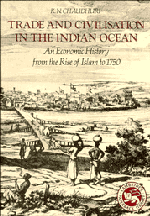Book contents
- Frontmatter
- Contents
- List of maps
- List of plates
- Preface
- Abbreviations
- Introduction
- Part I General problems and historical events
- Part II Structure and la longue durée
- 6 The sea and its mastery
- 7 Ships and shipbuilding in the Indian Ocean
- 8 The land and its relationship with long-distance trade
- 9 Commodities and markets
- 10 Capital and trade in the Indian Ocean: the problem of scale, merchants, money, and production
- 11 Conclusion
- Notes
- Glossary
- Guide to sources and further reading
- Bibliography
- Index
10 - Capital and trade in the Indian Ocean: the problem of scale, merchants, money, and production
Published online by Cambridge University Press: 05 August 2014
- Frontmatter
- Contents
- List of maps
- List of plates
- Preface
- Abbreviations
- Introduction
- Part I General problems and historical events
- Part II Structure and la longue durée
- 6 The sea and its mastery
- 7 Ships and shipbuilding in the Indian Ocean
- 8 The land and its relationship with long-distance trade
- 9 Commodities and markets
- 10 Capital and trade in the Indian Ocean: the problem of scale, merchants, money, and production
- 11 Conclusion
- Notes
- Glossary
- Guide to sources and further reading
- Bibliography
- Index
Summary
The historical overview of long-distance trade takes little account of features that define and describe an economic region. The subject, by its very nature, lends itself to a high degree of theorisation and abstraction. Whether trade is carried on by sea or land, the emphasis is generally on the scale of distance over which merchants travel and transport their goods. It is, of course, recognised that the character of the local economy and the changes taking place in it deeply influence long-distance trade, as do the political institutions of nation-states. Nevertheless, for most historians this assumption is the point of departure and not part of the analysis. The logic of international trade is mainly determined by the discrete existence of markets. Producers are separated from consumers by a double filter, that of geographical space and time. It is this particular feature of commercial transactions that turns trade into an activity involving the use of capital and its accumulation. A local region, even in the remote historical past, could have an exchange economy based on division of labour and the implied condition of capital accumulation. However, for a closed economic system with a limited spatial dimension it is not necessary to develop a more advanced circuit of capital which translates values into relative prices and economic surplus into money or productive capital. But interregional or long-distance trade cannot by definition function without capital, money, and prices.
- Type
- Chapter
- Information
- Trade and Civilisation in the Indian OceanAn Economic History from the Rise of Islam to 1750, pp. 203 - 220Publisher: Cambridge University PressPrint publication year: 1985



